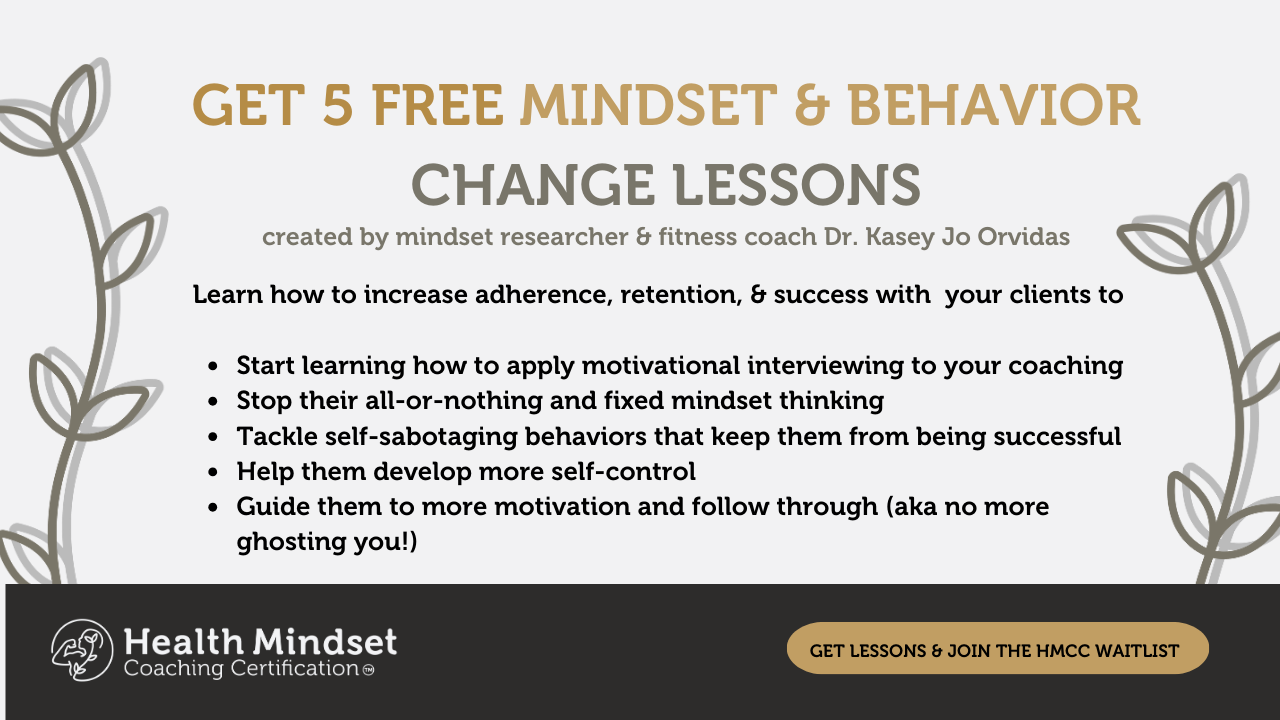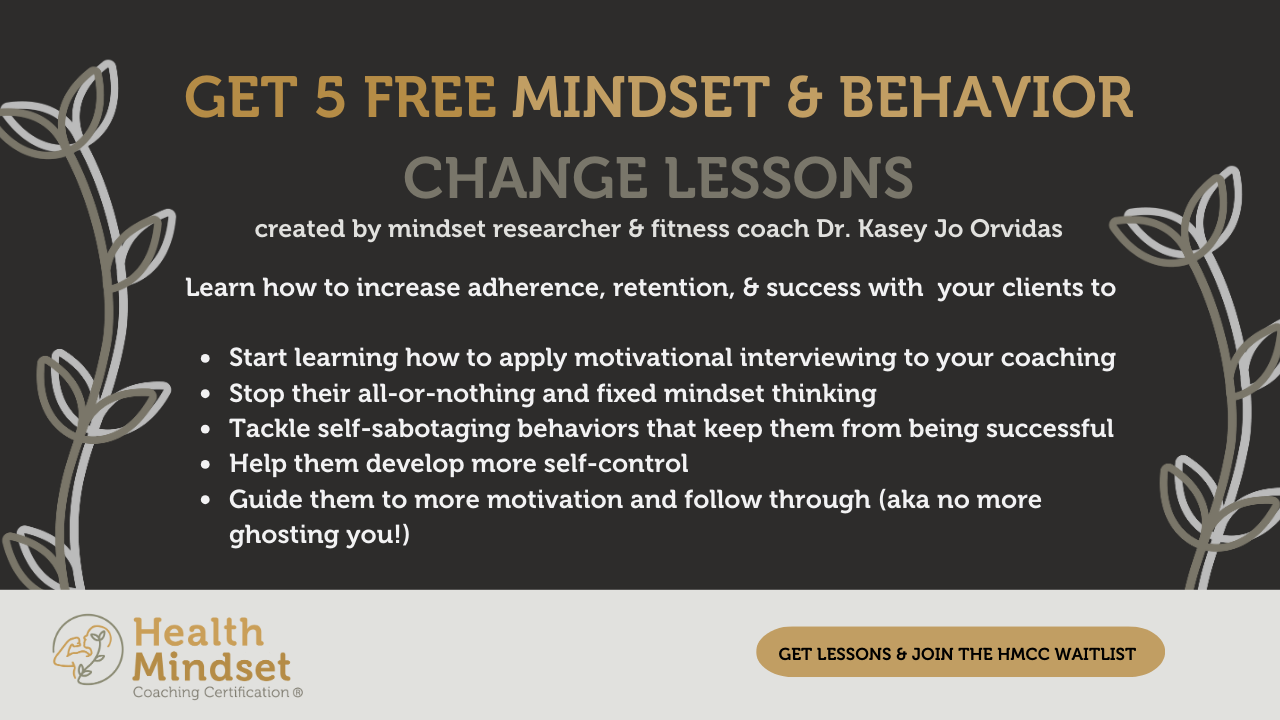3 Ways Fitness Coaches Can Effectively Motivate Clients for Success
Sep 13, 2024
As a fitness coach, you're probably constantly trying to find new ways to motivate clients to help them become more successful in their health and fitness journey. True client success doesn't just rely on motivation, though. You need to encourage lasting behavior change with your clients through your coaching program.
In this blog post, I will share key strategies for fitness coaches to support client motivation that leads to lasting behavior change and drive long-term success through autonomy, belongingness, and competence. These are the three main things that any fitness coach should focus on when trying to when it comes to client motivation and success.
If your clients aren't getting these basic needs met, things like behavior change, long-term goal achievement, and overall well-being will be difficult to obtain.
These needs are based on self-determination theory, which has been part of psychological research for a long time (since the 1980s) and explains what our human brain needs to make lifestyle changes, stay motivated, and be successful.
If you're a fitness coach who wants to apply psychology and exercise science to your coaching practice, these are three things you must include in your coaching practice.
Table of Contents
How Does a Fitness Coach Motivate Their Client?
How to Get Your Client Motivated
Increasing Client Autonomy to Support More Motivation
Create Behavior Change by Encouraging a Sense of Belonging
Client Competence is Key to Client Success
Intrinsic Motivation Leads to Greater Client Success
What Happens to Client Motivation When Needs Aren't Met?
Have More Successful Clients by Focusing on The Basic Psychological Needs
Combat Low Motivation by Becoming a Better Fitness Coach
Connect with us!
References

How Does a Fitness Coach Motivate Their Client?
Whether you're a personal trainer or an online fitness coach, you know that your client's success comes down to a lot more than motivation. You've probably even told your clients before that they won't always be motivated to put in the work, but they need to do it anyway.
So then, as health coaches, we have to ask ourselves: is it possible for us to motivate our clients or does it have to come from them? And if the latter is true, how can we help?
Fitness coaches have to find ways to get clients to focus on the end goal as much as they do on their progress.
Instead of asking how to increase client motivation, you should be asking how you can create conditions in which clients motivate themselves.
How to Get Your Client Motivated
When most people think about motivation, they think about the amount of motivation they have when they should be more focused on the kind of motivation they have.
Self-determination theory defines motivation in two categories: intrinsic and extrinsic
Intrinsic is personally fulfilling, aimed at outcomes we deeply value, and satisfies our basic psychological needs (autonomy, belongingness, and competence).
Extrinsic is often focused on others and conforming to social norms, is aimed at instrumental outcomes separate from behavior, and doesn’t satisfy our basic psychological needs
It’s not that all extrinsic motivation is bad, but intrinsic motivation is definitely best.
And it's your job as a fitness coach to draw out that intrinsic motivation from your clients
Coaching it’s about helping them want to do something rather than feeling like they have to, and a great coach will have strategies to create the conditions to help their clients achieve this.
Follow these three key steps to help your clients change their behavior.

Increasing Client Autonomy to Support More Motivation
Autonomy is all about feeling in control of our decisions and our lives. It means that we feel like we have choices and are willingly endorsing our behavior rather than feeling forced to do something.
Autonomy is all about choice.
At KJO Coaching, we have a website heading that says, “Our goal is NOT to keep you forever.” We say this because, as a coach, you shouldn't be making all the decisions and constantly telling your clients what to do.
If you want to help your clients cultivate a growth mindset and lasting behavior change, they need to feel like they are capable of making their own decisions.
As a fitness coach, you can use autonomy to encourage more motivation in your clients by giving them a sense of control over their fitness journey. This involves things like allowing clients to make choices about their workouts, such as figuring out which exercises they enjoy or showing them how they can make progress while still eating their favorite foods (and also not having them follow a meal plan).
By involving clients in decision-making, you can improve the coaching relationship with your client and create a sense of ownership and responsibility, which can enhance intrinsic motivation (more on that later).
Additionally, respecting clients' preferences and providing options empowers them, making them more committed and engaged in their wellness program.

Create Behavior Change by Encouraging a Sense of Belonging
Relatedness is feeling a sense of belonging and value by others. People need to have close, authentic relationships with others. They need to not only care for others but also feel that others care about them.
Behavior change, motivation, and success can be amplified if your clients feel like they belong to something.
Do you ever wonder why pretty much any program you join has some sort of community? It's because belonging to a community helps us create new habits and become more successful in our endeavors.
It is important to create a community amongst your clients and ensure they feel like they're part of something and that their voice is heard.
Clients are coming to you because they might not have people in their lives who are working toward similar goals or even understand their goals. Be that person for them. Be the one who supports them and lifts them up.
Creating that sense of belonging can be especially beneficial in the goal-setting stage while you're still building trust with your client.

Client Competence is Key to Client Success
Competence means your clients feel capable of achieving their goals and desired outcomes. It is essential to wellness because people need to gain mastery and control of their lives and environment.
Your clients need to feel that they possess the skills to achieve their wellness goals without you holding their hand forever. Your goal should be to help clients feel more capable in the gym, kitchen, and life.
You did your job as a fitness coach if your clients leave you feeling like they can do things on their own.
Clients who are super dependent on their coach aren't confident in their abilities and are less likely to be successful in the long term. They are also more likely to struggle with a fixed mindset.
When your client starts making progress with the tools you've given them to succeed (such as mindset exercises or self-sabotage tips), your client's motivation also increases, which snowballs into even more success.
Intrinsic Motivation Leads to Greater Client Success
Feeling in charge, connected, and capable is essential for producing intrinsic motivation (the “best” kind of motivation). Intrinsic goals are based on psychological needs and are personally fulfilling or satisfying.
Goals based on intrinsic motivation are the goals your client is more likely to achieve because they feel a deeper connection to these goals and, therefore, have a stronger desire to work toward them.
When clients have intrinsic motivation, they go to the gym, go for walks, play a sport, do yoga, etc., because they genuinely enjoy the process or find personal meaning in it rather than just pursuing external rewards.
This inner drive makes clients more resilient to setbacks and more likely to maintain consistent effort over time, leading to better adherence, greater progress, and long-term success in their fitness journey.
How well your client's health and fitness goals meet their intrinsic needs will determine their ability to be successful with them and maintain them long-term (Teixeira et al., 2012).
What Happens to Client Motivation When Needs Aren't Met?
Research shows that we create substitutes or compensatory behaviors to make up for unmet needs, and the results aren't pretty.
Some research has found that unmet needs can result in emotional distress and excessive or uncontrolled eating (Heatherton & Baumeister, 1991).
Further research shows that unmet needs can lead to rigid behaviors and shame when ultra-high or inflexible standards can't be achieved (Verstuyf et al., 2012), which is why we really want to help our clients combat all-or-nothing thinking and take a sustainable approach to their wellness.
Not to mention, clients with unmet needs have a stronger urge to eat and/or develop binge eating behaviors. They also lack goal progress and can develop mental health concerns (Schueler & Kuster, 2011).
Obviously, these research examples are pretty extreme, but if your client's ambitions stem from pressure from someone else, feelings of guilt, or a lack of belief in their abilities, then their basic needs won't be met.
And likely, neither will their goals.
They will not have the motivation or confidence to put to work the strategies you've outlined for them to help them change their habits and achieve their goals because they don't identify with those goals on a deeper level.
So, when you're goal-setting with a client, it's always important to identify where these goals are coming from and encourage your client to set goals using intrinsic motivation rather than pursuing something just because it's what they feel they "have" to do.

Have More Successful Clients by Focusing on The Basic Psychological Needs
If client adherence and retention are a struggle in your coaching, try assessing your client's goals and game plan with these needs in mind.
Do they lack a sense of belonging?
Feel out of place?
Don't feel confident in their capabilities?
Are they unsure of their ability to make sound decisions that align with their goals?
Fix those things by meeting their needs and see how things improve. You might even be surprised to see how much client motivation increases once you address these simple (but not necessarily easy) things.
Combat Low Motivation by Becoming a Better Fitness Coach
You can start by learning more about mindset and how to apply it to your coaching practice. I developed the Health Mindset Coaching Certification for coaches just like you.
Throughout this live 13-week program, you'll learn how to leverage the science of mindset and health behavior change to better encourage a growth mindset in your clients to promote increased retention, connection, adherence, and success.
And you can get started for FREE! Grab 5 free lessons in behavior change and mindset from my Health Mindset Coaching Certification HERE!

Check out this episode of my podcast, Not Another Mindset Show, for more on the key components of sustained behavior change.
I talk about how the ABCs of behavior change can have a significant impact on your client's success, not just in achieving their goals but in maintaining them long-term.
Connect with us!
Email: [email protected]
IG: @coachkaseyjo @healthmindsetcert
References
Heatherton, T. F., & Baumeister, R. F. (1991). Binge eating as escape from self-awareness. Psychological Bulletin, 110(1), 86.
Schüler, J., & Kuster, M. (2011). Binge eating as a consequence of unfulfilled basic needs: The moderating role of implicit achievement motivation. Motivation and Emotion, 35(1), 89-97.
Teixeira, P. J., Carraça, E. V., Markland, D., Silva, M. N., & Ryan, R. M. (2012). Exercise, physical activity, and self-determination theory: a systematic review. International journal of behavioral nutrition and physical activity, 9(1), 1-30.
Verstuyf, J., Patrick, H., Vansteenkiste, M., & Teixeira, P. J. (2012). Motivational dynamics of eating regulation: a self-determination theory perspective. International Journal of Behavioral Nutrition and Physical Activity, 9(1), 1-16.



